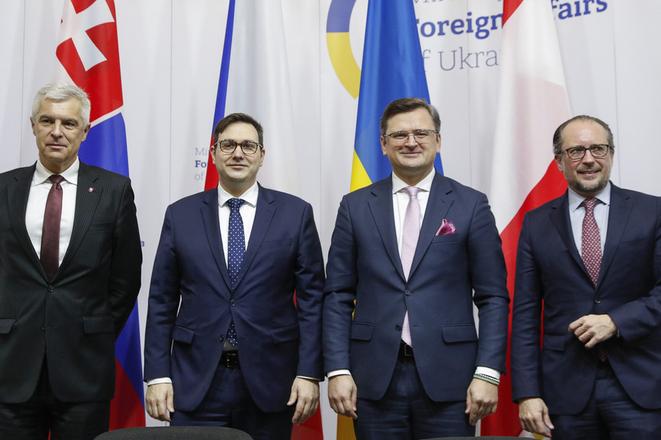Calls for increased efforts to find a diplomatic solution to de-escalate tension between Russia and Ukraine have materialised this week in a number of high-level ministerial visits in Europe.
Slovakia's Foreign Minister Ivan Korčok (SaS nominee), who has stressed the need for a diplomatic solution joined his Czech and Austrian counterparts on a trip of three foreign affairs ministers to Ukraine on February 7 and 8.
Czechia's Jan Lipavský, Slovakia's Korčok and Austria's Alexander Schallenberg travelled to Kyiv and to the contact line in the east of the country to familiarise themselves with the situation regarding the lasting tension at the Russian-Ukrainian border, the press department of the Slovak Foreign Affairs Ministry said.
“In a tense situation, it is necessary to show solidarity with Ukraine, our immediate neighbour,” Korčok wrote on Facebook ahead of the visit.
Some observers have highlighted the fact that this display of solidarity is taking place within what is known as the Slavkov composition (a grouping of Slovakia, Czechia and Austria), rather than within the better known regional grouping, the Visegrad Group (Slovakia, Czechia, Poland and Hungary).
Observers say that this is because foreign policy is an agenda of the Slavkov format, yet one reason is also the tense relations between Hungary and Ukraine. But they are clear on one thing: Slavkov does not have the ambition of replacing Visegrad.


 From left, Foreign Ministers Ivan Korčok of Slovakia, Jan Lipavský of the Czech Republic, Dmytro Kuleba of Ukraine, and Alexander Schallenberg of Austria, pose for photo after a joint news briefing in Kyiv, Ukraine, Thursday, Feb. 8, 2022. (source: TASR/AP)
From left, Foreign Ministers Ivan Korčok of Slovakia, Jan Lipavský of the Czech Republic, Dmytro Kuleba of Ukraine, and Alexander Schallenberg of Austria, pose for photo after a joint news briefing in Kyiv, Ukraine, Thursday, Feb. 8, 2022. (source: TASR/AP)